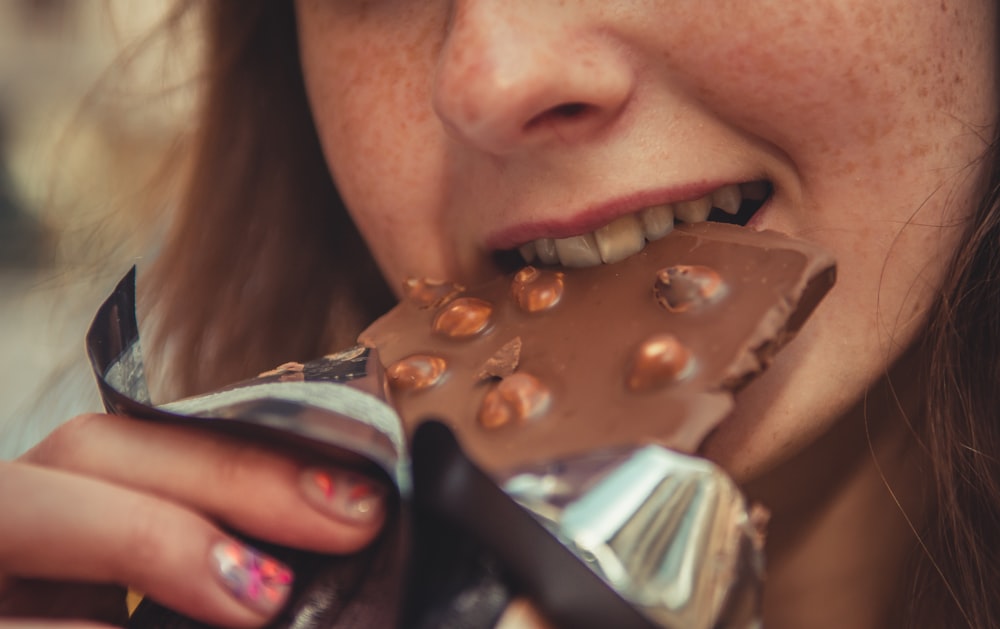
If you’re trying to master how to stop late-night snacking, you’re not alone. This unhealthy habit is incredibly common. Almost all of us have felt late-night hunger pangs and walked up to the fridge for a late-night snack. It is even more common for night owls who stay up late every night to binge on junk food from chips to cold pizza while gaming, working, or watching TV. Succumbing to these late-night cravings can happen even to the most healthy eaters, especially when your sleep routine is disturbed.
Late-night snacking is a form of disordered eating. Once you figure out how to stop late-night snacking and break the habit, you’ll notice a difference in your weight, energy and health.
If you are eating late into the night every single night while everyone else in the house is asleep or out of the house, you should pause and assess your behaviour. You could be experiencing Night Eating Syndrome and therefore find it difficult to control your eating patterns. Most who suffer from this condition eat solo because they feel guilty and embarrassed about their disordered eating habits.
Unfortunately, this late-night snack routine can be very bad for your health, which is why learning how to stop late-night snacking should be a top priority. You may be mindlessly consuming more calories than you realize, leading to weight gain or chronic diseases such as diabetes or hypertension. Christina Johnson, a Transformational Nutrition Coach, shared: “A study found that frequent eating at night between the time frame of 7pm to 11pm results in burning fat more slowly. The group of people who ate after 7pm gained compared to the group who ate between 8am to 7pm only. And here’s the kicker, both groups ate the same amount of food.”
If you feel concerned about your late-night snack habit, keep on reading. Apart from getting to the root cause of your disordered eating, let’s discover tips on how to stop late-night snacking and how to break this bad habit.
Factors That Contribute to Late Night Snacking
There are a plethora of factors that explain why people get hungry at night from common ones like stress-eating to boredom. If you want to curb your late-night snacking, figuring out the root cause is the start.
Several studies indicate that late-night hunger has a lot to do with your circadian rhythm or internal body clock. This recent study published in the Obesity Journal affirms that a person’s circadian rhythm has the power to elicit intense cravings, especially for sweet, starchy, and salty foods at night. It is interesting to note that late-night hunger could be partially genetic as it is related to your unique chronotype or your body’s inherent sleep-wake cycle.
On top of that, your daytime behaviour and eating patterns are culprits that could have something to do with your cravings. Yasi Ansari, MS, RDN, CSSD, typically work with clients who suffer from intense night cravings, and the first thing she asks them is if they are eating enough during the day. Often, under-eating during the day is the problem. Besides, excessive activity like working out more than usual, coupled with insufficient calories in the day, can lead to late-night hunger.
Ansari also pointed out that sleep could be the culprit, saying: “Not getting enough sleep can affect hunger and fullness hormones that are disrupted throughout the day. Ghrelin increases when we don’t get enough sleep, so you may be hungrier than usual at night.” Ghrelin is a peptide hormone that’s predominantly produced in the stomach. It stimulates the pituitary gland to secrete more growth hormone, which increases the appetite.

The Negative Consequences of Late Night Eating
Late-night eating, especially when you consume too much junk food, will interfere with a good night’s rest, resulting in poor sleep quality. You may find yourself tossing and turning in bed, feeling uncomfortable. When you consume a large meal, your body focuses its energy on digesting and metabolizing the food instead of winding down.
As a result, your calorific meal disrupts your sleep pattern. But, if that’s not enough to stop you from reaching from munchies at night, then the following adverse health impacts may motivate you to reevaluate your late-night snacking habit:
Weight Gain
If you want to stop yourself from late-night snacking, just think that it will make you gain weight. Besides, research shows that your ability to lose weight doesn’t depend on just calories alone, but the timing of when you eat your food has an impact. The calories you eat at night are more likely to be stored as body fat instead of getting burned.
Bad for Metabolic Health
If you frequently raid the fridge at night, you can be putting your metabolic health at risk. Studies prove that late-night eating results in the body’s decreased glucose tolerance. On top of that, the body finds it more difficult to metabolize carbohydrates and other nutrients. As a result, your body will burn fewer calories with a poor metabolic rate, and weight gain will creep up on you.
Adversely Impact Memory and Concentration
Your waistline is not the only thing that suffers when you give into nighttime cravings. Eating very late is bad for your brain health as well. The timing of meals has far-reaching effects on your brain’s physiology. Apart from adversely affecting your circadian rhythms, studies indicate that the brain’s ability to memorize, learn, and concentrate plummets with late-night snacking. On top of that, your sleep quality can also be impacted because nighttime eating patterns can cause disturbing dreams.
Increased Acid Reflux
Eating before bed increases acid reflux, especially since your stomach is busy digesting while you’re lying down. In addition, the pressure of the food can result in undigested food and stomach acids creeping their way up into the esophagus. For this reason, you need a 2-hour gap between your last meal and bedtime to prevent acid reflux.
Linked to Eating Disorders
If you find yourself in the kitchen every night, especially when you’re not really hungry, you could be dealing with Night Eating Syndrome. This combines overeating late at night with sleeping problems. It is also associated with other eating disorders like binge eating.
Hacks to Help You Learn How to Stop Late Night Snacking
Now that you understand that late-night eating is detrimental to your health, you may feel motivated to know how to cut this habit. So here are some helpful hacks on stopping you from raiding the kitchen cupboards and fridge at night:
Identify the Triggers
Track your food intake with an app and journal to identify patterns of events that set you to eat at night. For example, if you are not hungry but keep on munching before bed, you must discover what causes this. Identifying the problem is the first step in finding a solution. It could be anything like daytime hunger, emotional eating, excessive workouts, stress, and the like. When you know the source, you can easily break negative behaviour cycles.
Establish a Routine
If you overcompensate at night because you’re not eating enough during the day, you need to begin making a new routine. Set structured sleep and meal times so you can spread your food consumption throughout the day, ensuring you bust nighttime cravings. Besides, good sleep plays an important job when it comes to managing your weight. When you’re sleep-deprived, you tend to make poor diet choices. Having a specific and set time for eating and sleeping can do wonders.
Stay Hydrated
Since the body is made of 75% water, hydration plays a significant role in your holistic health. Brigitte Zeitlin, MPH, RD, CDN, says, “Hydration is key and it helps with stress. And it helps you to really get in touch with your hunger…when we are dehydrated, our bodies interpret that as hunger. So we’ll reach for more food, whether that’s a sugary item or not, when really we’re just thirsty.”
Carve Out the Time to Meal Prep
As a part of your new routine, you must use a plan to prep your meals for the week. Planning your meals and shopping for healthy snacks will reduce impulse eating and poor food choices. To help you outdo the following:
- Take out junk food from your house
- Make a food list for the week
- Stock up on fruits and veggies
- Advance meal prep in individual containers
When you have healthy food ready to eat, you cut your food anxiety. You know you have nutritious food waiting, pre-packed in the right portions. This helps you spread your food consumption in the day and keeps nighttime hunger at bay.
Find Ways to De-Stress
Stress and anxiety are the most common culprits that make people eat even if they’re not hungry. However, using food to soothe your emotions offers a temporary fix. If you notice that you binge eat at night because of stress, you must find different coping strategies. You can try the following:
- Yoga
- Pilates
- Meditation
- Gentle exercise
- Warm baths
- Massages

Learn to Distract Yourself
Usually, people are preoccupied with food thoughts due to boredom. If that’s the problem, you must find something you enjoy doing in the evening. For example, you can take a walk, read a book, or call a friend. Just do things that will keep your mind and body occupied so you can focus on things other than food. This is a great deterrent for mindless eating because you find satisfaction elsewhere.
Don’t Be Afraid to Ask for Professional Help
If you’ve tried everything in your power but just can’t stop yourself, you may need professional support. You could be suffering from the nighttime eating syndrome or binge eating disorder. In this case, a doctor can help you find your triggers and implement a treatment plan.
You can also take a more proactive approach to your health by taking a genetic test like CircleDNA. Test results will reveal your chronotype, showing what kinds of activities and eating patterns are most suited to your unique genetic makeup. Results also share the most optimal meals that complement your body for easy digestion, especially at night. You’ll even learn through CircleDNA if you have a high or low appetite control.
Keep in mind, when you feel real pangs of hunger at night, it can be difficult to sleep. However, the foods you should reach for must be a light snack that’s no more than 200 calories. Steer clear from junk foods, processed foods, spicy food, or anything caffeinated. Instead, pick half of a banana with peanut butter, an apple, boiled egg, OR light crackers with hummus. (Pick one of these and not all of them.)
Remember, late-night snacking due to boredom or anxiety leads to consuming excess calories which could result in obesity, poor health, disrupted sleep, low energy, and unstable moods. If nighttime eating is a problem for you, you must consider the tips in this article to help manage your disordered eating habits.

Comments are closed.